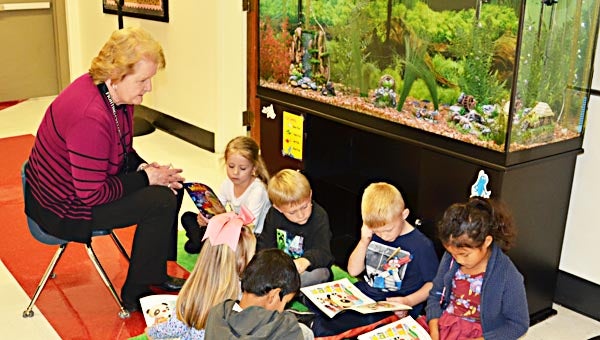Fluency Fish initiative helps students improve reading and math skills
Published 8:25 am Tuesday, October 20, 2015
A new initiative to improve student literacy at West Side Elementary has “o-fish-ially” begun.
In a 120-gallon fish tank — originally donated by Tennessee Valley Authority and found by Principal John Wright in the basement — now reside the school’s “fluency fish.”
The fish are patient listeners and are eager to listen as students read stories and practice multiplication tables.
“In just two weeks, their test scores have skyrocketed; after all, they are Reward School fish,” Wright said.
Children come independently and with classes to practice reading, and third grade language arts teacher Courtney Mathena said they admire the fish when they arrive and are dismissed.
During Fall break, Mathena and her husband Mikey created a lively fish habitat in the tank and populated it with six South American Cyclids that will grow along with their readers’ fluency.
Above the tank, a sign reads, “See how smooth our fish swim. That’s how smooth our reading should be too! Come and bring your favorite book….practice reading smoothly to our fish. The fish also want to hear your math facts!”
Mathena and her husband funded the project and maintain the tank. She derived the idea from a program called Reading Paws that was active in the school for a year. In that program, students read to therapy dogs and improved their fluency while enjoying the company of a calm animal. She says she believes that reading to fish will yield the same results and thinks this could be both soothing and stimulating for a variety of reasons.
“There is a huge amount of research that shows that children are more apt to read to animals, that they improve fluency and that struggling readers will usually find it easier to read to animals. It builds confidence,” she said.
Wright noted that it also gives students with speech impediments a non-critical environment in which to practice.
“Anything that builds a culture of reading is something that we want to promote,” said Wright. “Some of our struggling readers are already showing improvement when they read to the fish.”
Though they do not have official names, Wright said he has heard students call them a variety of names. This indicates they are bonding with the fish and learning about compassion for smaller creatures.
“Many elementary kids love animals, but don’t have pets at home,” said Mathena. “This helps make them happy and comfortable which will increase learning.”
The presence of fish also creates an outlet for students who are stressed or struggling emotionally.
“Kids need a place to focus and calm down,” said Wright. “We have high expectations, so it’s nice to have something soothing.”





